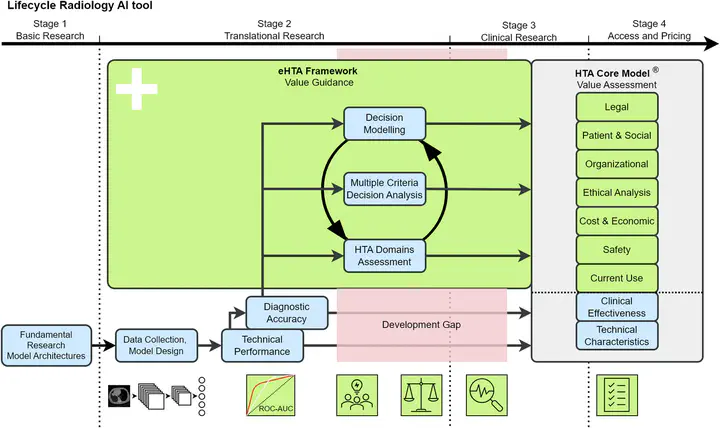ESR Essentials: How to Get to Valuable Radiology AI: The Role of Early Health Technology Assessment—Practice Recommendations by the European Society of Medical Imaging Informatics

Abstract
AI tools in radiology are revolutionising the diagnosis, evaluation, and management of patients. However, there is a major gap between the large number of developed AI tools and those translated into daily clinical practice, which can be primarily attributed to limited usefulness and trust in current AI tools. Instead of technically driven development, little effort has been put into value-based development to ensure AI tools will have a clinically relevant impact on patient care.
An iterative comprehensive value evaluation process covering the complete AI tool lifecycle should be part of radiology AI development. For value assessment of health technologies, health technology assessment (HTA) is an extensively used and comprehensive method. While most aspects of value covered by HTA apply to radiology AI, additional aspects, including transparency, explainability, and robustness, are unique to radiology AI and crucial in its value assessment. Additionally, value assessment should already be included early in the design stage to determine the potential impact and subsequent requirements of the AI tool. Such early assessment should be systematic, transparent, and practical to ensure all stakeholders and value aspects are considered. Hence, early value-based development by incorporating early HTA will lead to more valuable AI tools and thus facilitate translation to clinical practice.
This paper advocates for the use of early value-based assessments. These assessments promote a comprehensive evaluation on how an AI tool in development can provide valuevalue in clinical practice and thus help improve the quality of these tools and the clinical process they support.
An iterative comprehensive value evaluation process covering the complete AI tool lifecycle should be part of radiology AI development. For value assessment of health technologies, health technology assessment (HTA) is an extensively used and comprehensive method. While most aspects of value covered by HTA apply to radiology AI, additional aspects, including transparency, explainability, and robustness, are unique to radiology AI and crucial in its value assessment. Additionally, value assessment should already be included early in the design stage to determine the potential impact and subsequent requirements of the AI tool. Such early assessment should be systematic, transparent, and practical to ensure all stakeholders and value aspects are considered. Hence, early value-based development by incorporating early HTA will lead to more valuable AI tools and thus facilitate translation to clinical practice.
This paper advocates for the use of early value-based assessments. These assessments promote a comprehensive evaluation on how an AI tool in development can provide valuevalue in clinical practice and thus help improve the quality of these tools and the clinical process they support.
Type
Publication
European Radiology